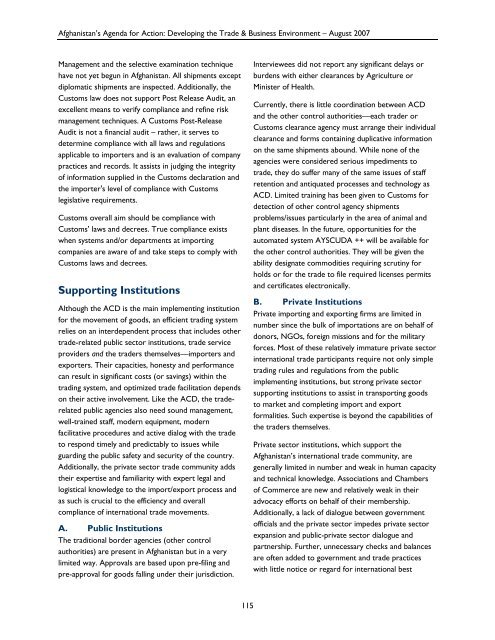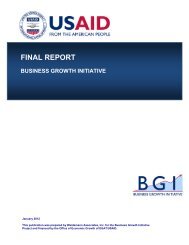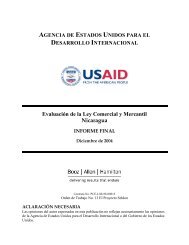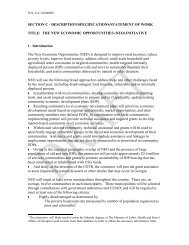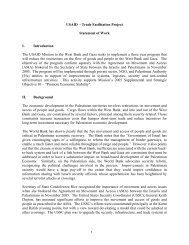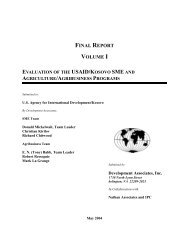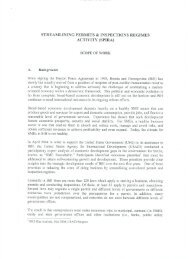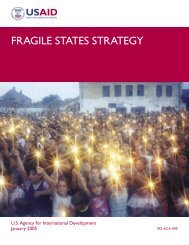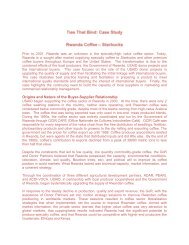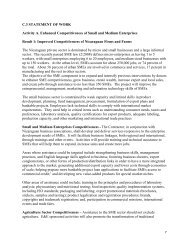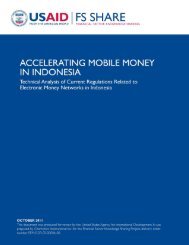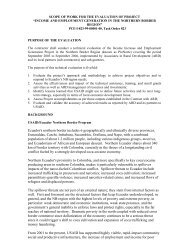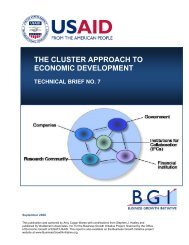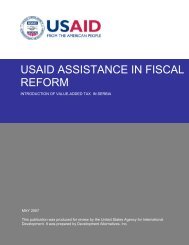Afghanistan's Agenda for Action - Economic Growth - usaid
Afghanistan's Agenda for Action - Economic Growth - usaid
Afghanistan's Agenda for Action - Economic Growth - usaid
You also want an ePaper? Increase the reach of your titles
YUMPU automatically turns print PDFs into web optimized ePapers that Google loves.
Afghanistan’s <strong>Agenda</strong> <strong>for</strong> <strong>Action</strong>: Developing the Trade & Business Environment – August 2007Management and the selective examination techniquehave not yet begun in Afghanistan. All shipments exceptdiplomatic shipments are inspected. Additionally, theCustoms law does not support Post Release Audit, anexcellent means to verify compliance and refine riskmanagement techniques. A Customs Post-ReleaseAudit is not a financial audit – rather, it serves todetermine compliance with all laws and regulationsapplicable to importers and is an evaluation of companypractices and records. It assists in judging the integrityof in<strong>for</strong>mation supplied in the Customs declaration andthe importer's level of compliance with Customslegislative requirements.Customs overall aim should be compliance withCustoms’ laws and decrees. True compliance existswhen systems and/or departments at importingcompanies are aware of and take steps to comply withCustoms laws and decrees.Supporting InstitutionsAlthough the ACD is the main implementing institution<strong>for</strong> the movement of goods, an efficient trading systemrelies on an interdependent process that includes othertrade-related public sector institutions, trade serviceproviders and the traders themselves—importers andexporters. Their capacities, honesty and per<strong>for</strong>mancecan result in significant costs (or savings) within thetrading system, and optimized trade facilitation dependson their active involvement. Like the ACD, the traderelatedpublic agencies also need sound management,well-trained staff, modern equipment, modernfacilitative procedures and active dialog with the tradeto respond timely and predictably to issues whileguarding the public safety and security of the country.Additionally, the private sector trade community addstheir expertise and familiarity with expert legal andlogistical knowledge to the import/export process andas such is crucial to the efficiency and overallcompliance of international trade movements.A. Public InstitutionsThe traditional border agencies (other controlauthorities) are present in Afghanistan but in a verylimited way. Approvals are based upon pre-filing andpre-approval <strong>for</strong> goods falling under their jurisdiction.Interviewees did not report any significant delays orburdens with either clearances by Agriculture orMinister of Health.Currently, there is little coordination between ACDand the other control authorities—each trader orCustoms clearance agency must arrange their individualclearance and <strong>for</strong>ms containing duplicative in<strong>for</strong>mationon the same shipments abound. While none of theagencies were considered serious impediments totrade, they do suffer many of the same issues of staffretention and antiquated processes and technology asACD. Limited training has been given to Customs <strong>for</strong>detection of other control agency shipmentsproblems/issues particularly in the area of animal andplant diseases. In the future, opportunities <strong>for</strong> theautomated system AYSCUDA ++ will be available <strong>for</strong>the other control authorities. They will be given theability designate commodities requiring scrutiny <strong>for</strong>holds or <strong>for</strong> the trade to file required licenses permitsand certificates electronically.B. Private InstitutionsPrivate importing and exporting firms are limited innumber since the bulk of importations are on behalf ofdonors, NGOs, <strong>for</strong>eign missions and <strong>for</strong> the military<strong>for</strong>ces. Most of these relatively immature private sectorinternational trade participants require not only simpletrading rules and regulations from the publicimplementing institutions, but strong private sectorsupporting institutions to assist in transporting goodsto market and completing import and export<strong>for</strong>malities. Such expertise is beyond the capabilities ofthe traders themselves.Private sector institutions, which support theAfghanistan’s international trade community, aregenerally limited in number and weak in human capacityand technical knowledge. Associations and Chambersof Commerce are new and relatively weak in theiradvocacy ef<strong>for</strong>ts on behalf of their membership.Additionally, a lack of dialogue between governmentofficials and the private sector impedes private sectorexpansion and public-private sector dialogue andpartnership. Further, unnecessary checks and balancesare often added to government and trade practiceswith little notice or regard <strong>for</strong> international best115


